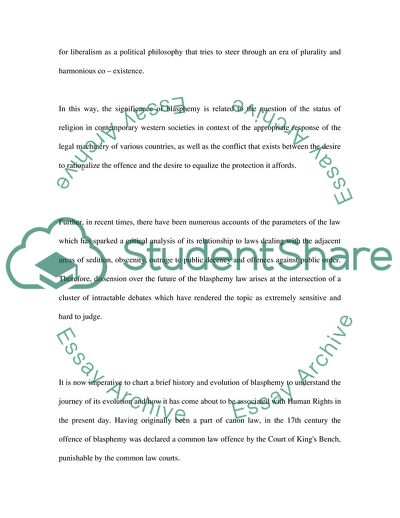Cite this document
(Laws of Blasphemy and Human Rights Assignment Example | Topics and Well Written Essays - 2000 words, n.d.)
Laws of Blasphemy and Human Rights Assignment Example | Topics and Well Written Essays - 2000 words. https://studentshare.org/law/1705555-to-what-extent-does-the-english-law-of-blasphemy-maintain-an-acceptable-balance-between-freedom-of-expression-protection-of-religious-sensibilities-what-impa
Laws of Blasphemy and Human Rights Assignment Example | Topics and Well Written Essays - 2000 words. https://studentshare.org/law/1705555-to-what-extent-does-the-english-law-of-blasphemy-maintain-an-acceptable-balance-between-freedom-of-expression-protection-of-religious-sensibilities-what-impa
(Laws of Blasphemy and Human Rights Assignment Example | Topics and Well Written Essays - 2000 Words)
Laws of Blasphemy and Human Rights Assignment Example | Topics and Well Written Essays - 2000 Words. https://studentshare.org/law/1705555-to-what-extent-does-the-english-law-of-blasphemy-maintain-an-acceptable-balance-between-freedom-of-expression-protection-of-religious-sensibilities-what-impa.
Laws of Blasphemy and Human Rights Assignment Example | Topics and Well Written Essays - 2000 Words. https://studentshare.org/law/1705555-to-what-extent-does-the-english-law-of-blasphemy-maintain-an-acceptable-balance-between-freedom-of-expression-protection-of-religious-sensibilities-what-impa.
“Laws of Blasphemy and Human Rights Assignment Example | Topics and Well Written Essays - 2000 Words”. https://studentshare.org/law/1705555-to-what-extent-does-the-english-law-of-blasphemy-maintain-an-acceptable-balance-between-freedom-of-expression-protection-of-religious-sensibilities-what-impa.


